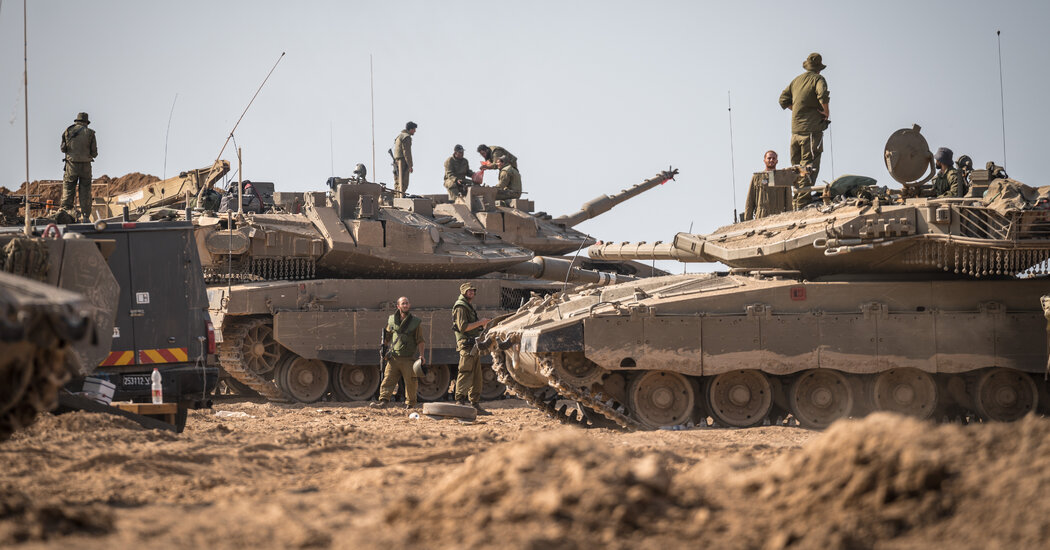At Temple Micah in Washington, the synagogue’s incoming president was preparing on Saturday to fulfill his duty to inform the congregation about routine business when he paused and took a breath, seeming to take in the gravity of the moment. Then he spoke.
“These are just announcements, and I’m getting emotional,” Brent Goldfarb said, before composing himself.
For many American Jews who attended service on this day, there were too many emotions to process. Horror and grief, fury and defiance. Fear for loved ones, for innocent lives caught in the middle, for the future. And the sheer weight of it all seemed overwhelming.
So being together, no matter their individual beliefs, brought a measure of solace.
“What I needed to do was get out of my house and be with my community,” said Isabel Hochman, 23, who attended the Saturday morning Sabbath service at Congregation Rodeph Sholom in Manhattan.
“What I’ve seen is Jews all over the world coming together. Our community is fractured, but we all came together this past week,” Ms. Hochman said. “I am saying that as someone who does not have family or friends who are Palestinian. I know their community is suffering as well.”
As Israeli leaders spent Saturday preparing for an invasion of Gaza, Jews at many U.S. synagogues grappled with the scale of overall devastation so far.
At Congregation Rodeph Shalom, a Reform synagogue in Philadelphia, Rabbi Eli Freedman led a Sabbath Torah study. He discussed the story of Cain and Abel and what it meant to be your “brother’s keeper” at a time when innocent lives — both Israeli and Palestinian — were being lost by the thousands.
“One hundred percent, Israel has a right to defend itself,” he said. He then added, “we have a responsibility to the innocent people of Gaza.”
Ruth Smith, who attended that Torah study, urged for a peaceful solution. “How many people can we kill in order to feel safe?” she asked.
A week into the war, the grief is only increasing, Rabbi Sam Levine of East Midwood Jewish Center wrote in prepared remarks that were read to congregants of the Conservative synagogue in Brooklyn. But he cautioned against succumbing to a “thirst for revenge” against Hamas.
“This is the instinct that has to be quashed. Otherwise, how are we any different from them?” he wrote.
Some leaders said that the very presence of the congregants on Saturday was a statement in itself. At Temple Micah in Washington, Rabbi Healy Shir Slakman said the meaning of Jewish identity is to show up when you are afraid, and perhaps especially when you are afraid. “Community is resistance,” she said.
In Los Angeles, Rabbi Nicole Guzik told the congregation at her Conservative synagogue, Sinai Temple, that by gathering, they were demonstrating that the community’s spirit would not be broken and were showing others in mourning that they were not alone.
“I have heard your cries and anger and confusion and heartbreak,” the rabbi said. “And instead of staying hidden under the covers, you’ve showed up.”
But overall, one sentiment shared by many was simply a weariness with their complex and often incongruous mix of feelings.
For Aliza Avital, 72, thinking about everything is too much. Her longtime friend, Vivian Silver, is a 74-year-old peace activist member of Kibbutz Be’eri, and she is believed to have been taken hostage by Hamas militants. The two were among the founding members of another kibbutz in Israel in the 1970s, said Ms. Avital, a member of the East Midwood Jewish Center.
“There’s so many emotions — it’s shock, it’s anger. It’s a nightmare,” she said. “I keep saying that word over and over. It’s just a nightmare.”
Peter Rabinowitz, 63, said that being surrounded by his community at Congregation Rodeph Sholom in New York helped soothe the pain and offered healing.
“I can breathe. I can cry. I can wonder. I can try to reconcile everything that is going on,” he said after the service. “It’s nice to be there for one another.”
Joel Wolfram in Philadelphia and Eliza Fawcett in New York contributed reporting.


